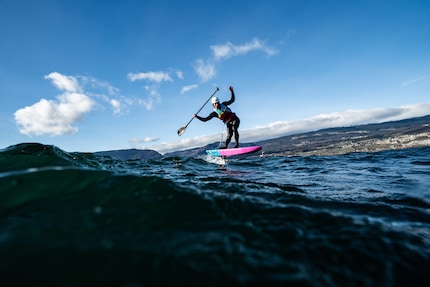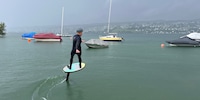
Background information
How Swiss water sports brand Ensis is shaping a new trending discipline
by Siri Schubert

Balz Müller and Michael Näf are Swiss pioneers in the international wing foiling scene. By coming up with ideas for new tricks and wing materials, they’ve had a profound influence on the up-and-coming sport. In this interview, they explain what makes the sport so fascinating and why they love flying over Switzerland’s waters.
Recalling his youth, Balz Müller says he probably spent more time windsurfing on Lake Biel than he did on dry land. He’s now one of wing foiling’s pioneers, driving the sport forward with his breathtaking tricks, boundless enthusiasm and contributions to developing wing foiling equipment.
Michael Näf has been into pump foiling – a sport in which a rider floats above the water on a board by using a combination of brute strength and a rear wing – for five years. As a windsurfer and wing foiler, he’s on the water almost every day, his favourite spot being Lake Lucerne.
I met them both for a chat in Düsseldorf at «Boot», the world’s largest water sports expo.
Can you explain what new water sports like wing foiling, pump foiling and SUP foiling mean to you?
Balz Müller: For me, water sports are all about fun. Having fun on the water and in the great outdoors. It’s like a playground for grown-up kids.
Michi Näf: The fascinating thing about foiling for me is flying over the water. It’s a real feeling of freedom, like surfing on cloud nine. I love sharing the experience with friends like Balz. When we’re on the water together, it’s always quite a spectacle.
When did you start winging?
Balz: Pretty much as soon as the sport was created, actually. I was one of the first in Switzerland to get my hands on a wing. That was in 2019 – and it was love at first sight. Wing foiling still gives me butterflies in my stomach. I’d say it combines all water sports: surfing, windsurfing and kitesurfing. That mix is what makes the sport ideal for me. The first time I tried it, I was on the board for eight hours. I was instantly hooked.
Which water sports did you regularly do before?
Balz: I’m 30 now, and I’ve been fascinated by windsurfing for 23 years. Foils turned gliding over water to flying over it. And when wings came along, things got even wilder.
Editor’s note: you can find out more about this on-trend sport here:
Michi: I got hooked on it right away as well. Balz and I got into it right from the off, experimenting daily with new tricks. Every day really was an adventure. Then pump foiling came along, meaning we no longer needed wind to be able to fly and feel that freedom.
Balz: Yep, you can do that all year round in Switzerland (laughs).
You’ve made a name for yourselves internationally in the racing scene. What have been your biggest successes so far?
Balz: My wife Eva and I won the first international freestyle winging events. We shared the podium. Being able to pioneer and shape a sport and be part of its evolution is really cool. That was in 2020, but I got really good results in subsequent years as well. Last year, I still managed to come third in several World Tour events. It’s really cool that I’m still making an impact despite being probably the oldest person on the World Tour. It’s interesting to see how younger, more acrobatic riders are picking up the baton now.
Michi: My first highlight was the Global Wingsports Association race in Silvaplana in 2020. The equipment was nowhere near what it is today – we were pumping until our lungs burned (laughs). Everyone showed up with different boards, wings and foils. One racer’s board was so small that he couldn’t even get out of the water. When we crossed the finish line, he was still at the starting line, almost up to his neck in water. A lot’s changed since then.
Balz: Things suddenly picked up pace from there. We competed in our first international race in Brazil. As inland surfers, we really struggled with the waves – the ocean really did swallow us up and spit us back out again. Even so, we managed to hold our own and finish on the podium. That was a great experience.
How did racers from coastal countries such as Hawaii, Brazil, South Africa and Japan see you?
Balz: At first, people completely ridiculed us as freshwater pirates. But to be fair, we also positioned ourselves on the waves really stupidly. My clumsiness at that first event made history (laughs). I’d done a jump when a wave came from behind and washed me right onto the sand. The pictures made me famous, but not in a good way (laughs).
Michi: But we learned our lesson and earned the respect of the Hawaiians.
Balz: In Switzerland, we all want to be surfers. We want that feeling of gliding down the waves. With a foil, you can surf a 50-centimetre wave and feel like you’re riding a Hawaiian wave. Foils have caused the Mecca of surfing to shift slightly inland, away from Hawaii and into gentler waters. Surfing the smallest wave feels like you’re somewhere out at sea. And the fact that World Cup races are held here in Switzerland is also a sign.
Michi: It’s incredible, really. Who would have thought that we’d ever be able to ride waves like that here in Switzerland? And over long distances too.
Balz: I surfed what was basically the longest wave of my life on Lake Neuchâtel when it was windy. I went out on the lake with my SUP foil board and caught wave after wave. That was 20 kilometres of surfing on this huge expanse of water. Even though it’s a lake, you feel tiny against the power of nature. It just goes to show that you can have incredible adventures here in Switzerland.
You’re both riders on the Ensis team and are involved in developing new equipment. What does that mean to you guys?
Balz: The sport is still very young and the equipment is improving pretty much constantly. It’s amazing to be involved in that process.
Michi: Until now, new water sports equipment has almost always come from Hawaii or other coastal nations. Things are different at Ensis. We develop equipment in Switzerland for Swiss waters. It’s definitely a childhood dream of mine to be so heavily involved in the water sports industry.
How easy is it for beginners to pick up these new sports?
**It’s certainly easier to learn how to do wing foiling, SUP foiling or pump foiling on Swiss lakes than it is to learn to surf on the ocean with waves, currents and choppy water.
Balz: You can’t just instantaneously learn to SUP foil – and you certainly need more than an hour-long lesson. You’ve got to be able to tolerate frustration – and a few falls – before you get the hang of it. But that’s the advantage of doing water sports: it doesn’t hurt when you fall. You can always get back on the board and try again until you succeed. You’ve got to push the boundaries of your comfort zone. Even so, I’d say that anyone who’s motivated and willing to improve their balance will be able to take to the foil.
Michi: Of course, it helps if you already have experience with other board sports – kiting, windsurfing, surfing or skateboarding. Practising on a balance board is also useful. The absolutely fascinating thing is that anyone who ever tries floating over the water on a foil never wants to go back to other board sports.

Balz: When developing equipment at Ensis, we place a lot of importance on the beginner level. We offer special soft-top boards that make learning easier. Of course, we’re a premium brand and value quality. But it’s just as important to us that younger and older people can learn the sport comfortably and see progress.
What else do beginners need to be aware of?
Balz: Safety is a major priority of ours. We began developing helmets right from the get-go. After all, they do say that a clever head is a protected head! Just like when you’re cycling or snowboarding. And that goes for beginners and pros alike. You’re not allowed to enter competitions without a helmet.
**Nobody goes out on the water with us unless they’re wearing a helmet and an impact protection vest. We always make sure that safety equipment is available on test days too. It’s important to have good products and to learn the sport at a water sports school or from experienced foilers. This is an absolute must if you’re to take your foiling experience to a new level.
Header image: Ensis
Research diver, outdoor guide and SUP instructor – I love being in, on and around water. Lakes, rivers and the ocean are my playgrounds. For a change of perspective, I look at the world from above while trail running or flying drones.
Interesting facts about products, behind-the-scenes looks at manufacturers and deep-dives on interesting people.
Show all
Background information
by Siri Schubert

Background information
by Siri Schubert

Background information
by Philipp Rüegg